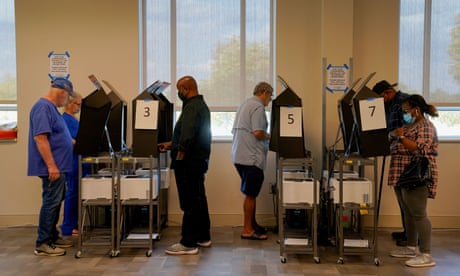- by foxnews
- 08 Apr 2025
Early voters in Georgia face obstacles under state’s new election law
Early voters in Georgia face obstacles under state’s new election law
- by theguardian
- 23 Oct 2022
- in news

Jennifer Jones, a Morehouse School of Medicine PhD student, showed up to her precinct in Fulton county, Georgia, on the second day of early voting for the midterm elections. She was excited to cast her ballot for her chosen candidates in the gubernatorial and Senate races, Stacey Abrams and Senator Raphael Warnock. However, when she reached the check-in station at the polling site, she was informed that she would be unable to cast a regular ballot because her validity as a voter was challenged.
"When I handed in my ID, the poll worker said I was being challenged," said Jones. "They said I had to complete a provisional ballot, but I wasn't really comfortable doing that, so I didn't get to cast my ballot that day."
Under the state's new Election Integrity Act, Georgia citizens can challenge a voter's eligibility on the state's voting rolls an unlimited number of times. Right-wing groups, spurred by baseless claims that the 2020 election was rife with voter fraud, have mounted thousands of organized challenges across the state, putting even more pressure on the election process for voters, poll workers and election officials. While most have been dismissed already, more challenges cropped up ahead of early voting.
In most cases, voters like Jones don't know why their status is being challenged in the first place, causing even more confusion.
"The poll worker didn't tell me why I was being challenged, even after calling someone else for assistance," said Jones. "They just kept telling me I would have to vote with a provisional ballot."
Georgia voters turned out in record numbers for the first week of early voting, casting their ballots in the two critical elections, the gubernatorial and Senate races. However, as the election progresses, the impact of Georgia's new voting laws continues to unfold. Election and voter protection organizations across Georgia have been preparing for moments like this, working to educate voters on what to do if they experience issues when voting.
"I felt discouraged, but I knew I needed to reach out to someone for help and knew I could call Fair Fight and get help," said Jones.
Fair Fight, a national voting rights organization based in Georgia, has used grassroots campaigning since its founding to educate voters on the resources at their disposal each election season. When Jones called Fair Fight, the organization connected her with Helen Butler and the Election Protection Project.
"I informed [Helen Butler] what happened and told her that I had my ID and precinct card and everything," said Jones. "She seemed surprised that they wouldn't let me cast a regular ballot."
Butler, the executive director of the Georgia Coalition for the People's Agenda, believes Jones's ordeal points to a more significant issue this election season.
"This whole thing, and the new law, is alienating more people about the election process," says Butler. "Especially people like Ms Jones, who was targeted and shouldn't have been, just because the poll worker wasn't aware of the additional instructions from the secretary of state's office."
These additional instructions from the secretary of state explain that counties should work in favor of the challenged voter, granting poll workers the ability to verify a voter's residence at the precinct when provided with documentation of the voter's address or by having the voter sign a residency affirmation form. Once a voter completes these steps, which can be done on the spot, the voter should then be given access to a regular ballot.
However, Butler asserts that this process was not initially made clear. "The first notice they sent out was not very clear, but the second notice gave clearer guidance," she said. "Somewhere along the line, maybe by the county not updating the poll workers, there is miscommunication."
To Butler and other voting rights organizers, these instances of miscommunication at the polls stem from the state's new voting law.
"SB202, this Election Integrity [Act], has highlighted that folks can now do unlimited challenges," said Butler. "And though people have always been able to challenge the voting rolls, this again creates a problem and creates distrust and is ultimately trying to limit who has access to the ballot."
Jones is just one of the voters whose distrust of Georgia's electoral process has grown this election season. "I do feel disenfranchised, especially as a Black voter, and because of the way I vote," she said. "I know they offered a provisional ballot, but I just didn't know if it would be counted properly."
Another aspect of the new voting law includes new rules surrounding provisional ballots. While Jones's case would not necessarily fall under this aspect of the law, which states that provisional ballots submitted outside of a voter's precinct will not be counted, she says her broader distrust of the electoral process deterred her from voting with a provisional ballot that day. Still, Jones knows the importance of seeing this process through and clearing the challenge against her voting eligibility. She still plans to vote this election.
"My grandmother marched with Dr Martin Luther King; my family fought for this," said Jones. "I am the next generation that she was fighting for, and I am not about to let up. I will not risk getting to cast my vote. I will not stop fighting, and I will not be complacent in the difficulty of this process."
- by foxnews
- descember 09, 2016
Ancient settlement reveals remains of 1,800-year-old dog, baffling experts: 'Preserved quite well'
Archaeologists have recently unearthed the remarkably well-preserved remains of a dog from ancient Rome, shedding light on the widespread practice of ritual sacrifice in antiquity.
read more


